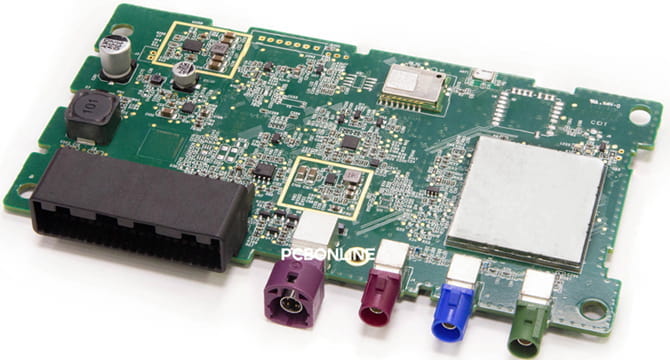Automotive Components VS Automotive Chips
Automotive components are automotive-grade electronic parts used for electronics systems for cars and vehicles. There are automotive passive components and active components.
![]()
While automotive chips or ICs, are automotive-grade integrated circuits that carry extremely highly-dense circuits or passive components on silicon chips. ICs belong to the active components category.
To know more about passive and active components, you can read this article.
What Does Automotive Grade Mean For Electronic Components and Chips
![]()
There are four grades of electronics manufacturing: defense/aerospace > automotive > industrial > commercial electronics. If components, chips, and PCBs are at the automotive grade, they are manufactured to quite a high level.
For electronic components and chips, the automotive-grade means:
High standards
Automotive-grade passive components should be compliant with AEC Q200, ASILI/ISO 26262 Class B, and IATF 16949.
Automotive-grade active components (including automotive chips) should be compliant with AEC Q100, ASILI/ISO 26262 Class B, and IATF 16949.
Long lifespan
Cars and vehicles are durable commodities, and their life span is usually designed to be about 15 years or 200K kilometers en route.
So will be the lifespan of automotive components and chips.
Wide operating temperature range
The operating temperature range of commercial electronics is 0℃ to 70℃. Compared to electrical parts for commercial uses, automotive components and chips have higher requirements.
For example, the operating temperature range of components and chips in and around the engine is -40℃ to 150℃. That of components in and around the passenger compartment is -40℃ to 85℃.
Excellent resistance to harsh environments
As cars and vehicles run, automotive components and chips work in harsh environments, such as vibration, dust, high temperature, harmful gas, moisture, and strikes. Therefore, automotive electronics should have a high resistance to these harsh factors.
Quality consistency
Car and vehicle manufacturing is in batch, and automotive hardware quality consistency matters for driving security. The quality of automotive components should be highly consistent so that the automotive manufacturers can make sure of the quality consistency of automotive systems and the whole car/vehicle. For this reason, requirements for the automotive components and chips are based on the PPM(parts per million).
How Many Automotive Chips Does a Car Need
In recent years, the automotive chip shortage has stirred up discussions about automotive chip supply and needs. How many automotive chips are needed for manufacturing a car?
A traditional car needs 500 to 600 automotive chips.
An electric car needs about 2,000 automotive chips as it has a large amount of DC-AC inverters, transformers, and converters, and these modules lead to an increase of IGBT, MOSFET, diodes, and so on in a car.
According to a survey, the number of automotive chips required for manufacturing a car reaches 1000+ in 2021.
However, the supply of automotive components and chips can't meet the increased demand temporarily yet. That's why the delivery delay of new cars is frequently seen in the whole world.
What Automotive Chips Does a Car/Vehicle Use
Cars and vehicles are becoming smarter and smarter thanks to automotive chips. There are 3 types of automotive chips:
- The micro control unit (MCU). MCUs are used for the electrical control system, engine, fuel system, information and entertainment system, drive train, autopilot system, etc.
- Automotive power chips. They are mainly used for the power control system, lighting system, fuel system, etc.
- Automotive chips for sensors. Automotive sensors such as tire pressure sensors, water temperature sensors, and electronic accelerator pedal position sensors are developed and operated based on chips.
One-Stop Solution to Automotive PCB Assembly - PCBONLINE
![]()
From the advanced PCB manufacturer PCBONLINE, you can get one-stop solutions for automotive electronics manufacturing, including automotive PCB manufacturing, automotive PCB assembly, and automotive components and IC sourcing.
Reasons to work with PCBONLINE for Automotive PCBA One-Stop Solution:
- ISO, IATF 16949, REACH, UL, RoHS-certified automotive PCB manufacturing
- Automotive PCB assembly following IPC-A-610 Class 2/3
- Quality automotive components and IC sourcing at possibly the lowest price
- One-on-one engineering support with free DFM, DFT, DFX
- Quality components and ICs from audited direct factories and suppliers, no refurbished
Please check PCBONLINE's automotive PCBA solution capabilities below.
|
|
Automotive EMS capabilities |
|
PCB layers |
1 to 64 |
|
PCB types |
rigid-flex, FPC, ceramic, RF microwave, HDI, high TG, aluminum, thick-copper |
|
PCB assembly finest pitch |
0.35mm |
|
Smallest SMD packaging |
01005 |
|
Component sourcing |
one-stop with your BOM, traceable |
|
Tests |
AOI, flying probe, X-ray, four-terminal sensing, thermal aging, functional test, free IC counterfeit detection |
|
Other services |
Conformal coating, IC programming, end-product assembly |

PCBONLINE has robust automotive electronic mainboard fabrication and assembly capabilities, including speedy delivery, and electronic components integration sourcing for prototypes and bulky manufacturing.
If you want automotive components and ICs, PCB manufacturing, and PCB assembly, please feel free to send your BOM and Gerber by email at info@pcbonline.com.
Conclusion
Automotive components and chips are middle and high-end electrical parts. Passive automotive components should be compliant with AEC Q200 standards, and active automotive components including automotive chips should be compliant with AEC Q100 standards. If you are looking for automotive components sourcing, and automotive PCB manufacturing/assembly, do not miss the 22-year-old EMS manufacturer PCBONLINE.




